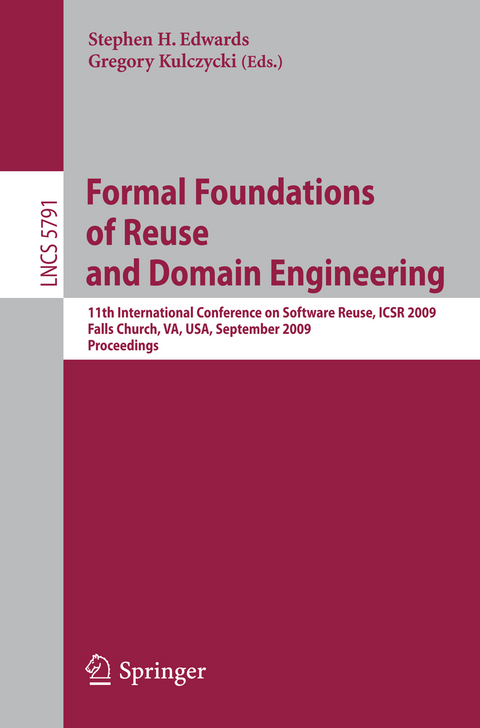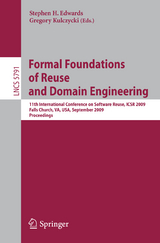Formal Foundations of Reuse and Domain Engineering
Springer Berlin (Verlag)
978-3-642-04210-2 (ISBN)
Component Reuse and Verification.- Consistency Checking for Component Reuse in Open Systems.- Generating Verified Java Components through RESOLVE.- Increasing Reuse in Component Models through Genericity.- Verifying Component-Based Software: Deep Mathematics or Simple Bookkeeping?.- Feature Modeling.- Extending FeatuRSEB with Concepts from Systems Engineering.- Features Need Stories.- An Optimization Strategy to Feature Models' Verification by Eliminating Verification-Irrelevant Features and Constraints.- Reusable Model-Based Testing.- Generators and Model-Driven Development.- A Case Study of Using Domain Engineering for the Conflation Algorithms Domain.- Model Transformation Using Graph Transactions.- Refactoring Feature Modules.- Variability in Automation System Models.- Industry Experience.- A Case Study of Variation Mechanism in an Industrial Product Line.- Experience Report on Using a Domain Model-Based Extractive Approach to Software Product Line Asset Development.- Reuse with Software Components - A Survey of Industrial State of Practice.- Product Lines.- Evaluating the Reusability of Product-Line Software Fault Tree Analysis Assets for a Safety-Critical System.- Feature-Driven and Incremental Variability Generalization in Software Product Line.- Identifying Issues and Concerns in Software Reuse in Software Product Lines.- Reuse of Architectural Knowledge in SPL Development.- Reuse and Patterns.- Introducing Motivations in Design Pattern Representation.- The Managed Adapter Pattern: Facilitating Glue Code Generation for Component Reuse.- Reusing Patterns through Design Refinement.- Service-Oriented Environments.- Building Service-Oriented User Agents Using a Software Product Line Approach.- DAREonline: A Web-Based Domain Engineering Tool.- Extending a SoftwareComponent Repository to Provide Services.- A Negotiation Framework for Service-Oriented Product Line Development.- Ranking and Selecting Services.- A Reusable Model for Data-Centric Web Services.
| Erscheint lt. Verlag | 11.9.2009 |
|---|---|
| Reihe/Serie | Lecture Notes in Computer Science | Programming and Software Engineering |
| Zusatzinfo | XI, 299 p. |
| Verlagsort | Berlin |
| Sprache | englisch |
| Maße | 155 x 235 mm |
| Gewicht | 480 g |
| Themenwelt | Mathematik / Informatik ► Informatik ► Software Entwicklung |
| Informatik ► Theorie / Studium ► Compilerbau | |
| Schlagworte | component reuse • component verification • feature modeling • generators • Hardcover, Softcover / Informatik, EDV/Informatik • model-driven development • Modeling • programming patterns • service-oriented environments • Software Patterns • structured analysis • verification |
| ISBN-10 | 3-642-04210-4 / 3642042104 |
| ISBN-13 | 978-3-642-04210-2 / 9783642042102 |
| Zustand | Neuware |
| Haben Sie eine Frage zum Produkt? |
aus dem Bereich




